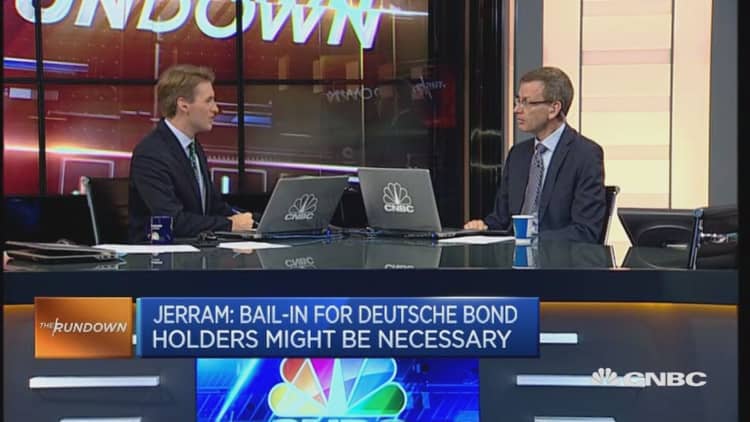
A Deutsche Bank settlement with the U.S. Department of Justice (DOJ) won't solve the bigger issue at hand - the fragile state of European banks, analysts told CNBC on Monday.
Confidence in the German bank was shaken last week, with its share prices gyrating over fears Deutsche may not withstand the impact of a $14 billion settlement to end a mortgage-backed securities mis-selling case.
On Friday, Deutsche Bank's U.S.-listed shares jumped 15 percent after the AFP wire cited a source as saying the bank may be nearing a $5.4 billion settlement with the DOJ, a big discount on the original penalty suggested by the DOJ. CNBC has not independently confirmed the report.
On Monday, the Wall Street Journal reported that talks between the bank and officials were ongoing, with no deal yet presented to senior decision makers on either side for approval.
But Richard Jerram, chief economist at the Bank of Singapore, told CNBC's "The Rundown" that even if a settlement averted further panic over Deutsche's financial stability, there was an underlying issue that would continue to undermine confidence.
"They can reach a deal where it's $4 billion or $5 billion, which, based on precedence, I guess is the ball park," Jerram said, referring to the size of settlements reached in similar cases by other banks.
"But, of course, you still have this problem of big overcapacity in the German banking system, and the lack of profitability,"
The European banking sector has struggled to bolster investor confidence, with banks in Italy plagued by non-performing loans estimated to be worth 360 billion euros ($404.50 billion) in total.
Meanwhile, German lender Commerzbank on Thursday announced a structural overhaul that included cutting 7,300 jobs and halting dividends in the hope of increasing profits.
"The European Union banking sector is going to continue to be weak, whilst their profitability is being hit on two sides, by requirements for higher capital levels and with their margins being impacted by negative rates," Angus Nicholson, a market analyst at spreadbettor IG, told CNBC by email.
This weakness meant it "doesn't take much to raise systemic concerns," Nicholson explained.
The market panic about Deutsche Bank was set off on Thursday when Bloomberg News reported that about 10 hedge funds that cleared derivatives trades with Deutsche had cut their exposure to the bank, possibly due to a lack of confidence in the bank's liquidity.
Most market commentators quickly pointed out that Deutsche Bank's issues were not similar to those faced by Lehman Brothers prior to its collapse in 2008 - an event that heralded the Global Financial Crisis. Market confident in Lehman was wiped out, as began to occur with Deutsche Bank, but Lehman also had big solvency problems, which Deutsche, although heavily indebted, does not.
But others have cautioned that the risk posed to the global banking system by Deutsche Bank was still significant.
"Deutsche Bank is much bigger [than Lehman] and much more systemic," Jerram said.
Ashish Goyal, head of emerging markets equity at NN Investment Partners in Singapore, told CNBC's "Capital Connection" there were two worrying aspects about the German bank.
"One is, [Deutsche Bank] doesn't have a lot of spare capital. Two, it still holds a very large - among the largest - holdings of Level 3 securities, which a lot of people have doubts about what the true value, true exposure there is," Goyal said, adding the bank's future was crucial to the entire global financial sector.
Level 3 securities are very illiquid assets that can't be given a fair value by usual market pricing processes.
Deutsche Bank said in quarterly earnings presentation that as of June 30 it had $6.17 billion in litigation reserves, and CEO Cryan has sought to play down market concerns, telling staff on Friday that the bank met all current capital requirements.
"Our bank has become subject to speculation. Ongoing rumors are causing significant swings in our stock price," he wrote to employees.
"It is our task now to prevent distorted perception from further interrupting our daily business. Trust is the foundation of banking. Some forces in the markets are currently trying to damage this trust."
Experts have said that if Deutsche Bank did suffer liquidity problems, there was little prospect the German government would give the company emergency funding, nor would it pressure Deutsche's bondholders to write off their losses in order to save the company - known as a "bail in."
"It's difficult for the Germans, having pressured the Italians not to have state aid for their banks, pressuring to have a bail in," Jerram said.
— Evelyn Cheng contributed to this report.


